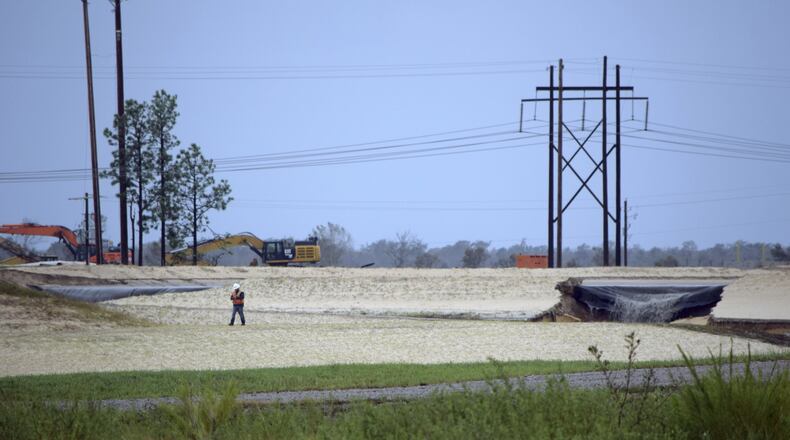Eleven of Georgia’s 12 coal-powered plants are leaking chemicals into the groundwater, according to a study by a group of environmentalists that was released Thursday.
Ten of those 11 plants are owned by Georgia Power, the state’s leading energy supplier.
Georgia Power officials said repeated tests over the past several years show that chemicals from any leakage have not had an impact on the state’s water quality.
Conservation groups Environmental Integrity Project and Earthjustice released the study Thursday looking at information for Georgia's 12 coal-powered plants made public through the 2015 federal Coal Combustion Residuals Rule.
The environmentalists said the study should spur lawmakers to strengthen Georgia’s coal ash regulations by requiring utilities to remove waste from leaking, unlined coal ash ponds.
“Georgia is at a crossroads with respect to the toxic legacy of coal burning,” Environmental Integrity Project attorney Abel Russ said. “If coal ash is left buried in groundwater, then the contamination we see now will only get worse, and it will continue for generations. Hopefully, Georgia will take the other path and require the real cleanup of all coal ash dumps, including those that were abandoned years ago.”
Coal ash contains a variety of toxins — including arsenic, cadmium and lead. Those toxins can cause illnesses such as cancer and heart disease.
Georgia Power is in the process of shutting down all 29 of its coal ash ponds at 11 plants statewide. The company submitted plans last month to the state’s Environmental Protection Division for approval to either excavate, consolidate or cap the ponds. The EPD could not be reached for comment Wednesday.
“Once the ponds are closed we will continue to monitor the groundwater around them to ensure the quality for at least 30 years,” said Aaron Mitchell, the general manager of environmental affairs with Georgia Power.
All utilities nationwide were required earlier this year by the federal coal ash rule to publish data showing they complied with laws to keep groundwater safe.
“Because utilities were forced to report groundwater monitoring data by the 2015 coal ash rule, as well as report whether their coal ash ponds are actually sitting in groundwater, we now know the scope and severity of water contamination from coal ash in Georgia,” Earthjustice senior counsel Lisa Evans said. “Now that communities can see the evidence of toxic pollution leaking from these ponds, they can hold utilities accountable.”
Mitchell said Georgia Power began sharing its data online 18 months before the March deadline.
According to federal law, coal ash ponds must be built more than 5 feet above groundwater with no underground connections that could allow the leakage of pollutants into the aquifer.
The study found that the 10 coal ash ponds that violate the aquifer separation requirement are located at six Georgia Power plants: Plants Bowen, Hammond, McIntosh, Scherer, Wansley and Yates.
The study also said that most drinking water wells near the sites have not been tested for toxins, so it is unclear whether contaminated groundwater is threatening public health.
That is not the case, Mitchell said.
“The intent for every single closure — whether excavation or closing in place with additional advanced engineering measures — is to make sure groundwater is protected during and throughout the life of that closure,” he said.
Stay on top of what’s happening in Georgia government and politics at ajc.com/politics.
About the Author
Keep Reading
The Latest
Featured




